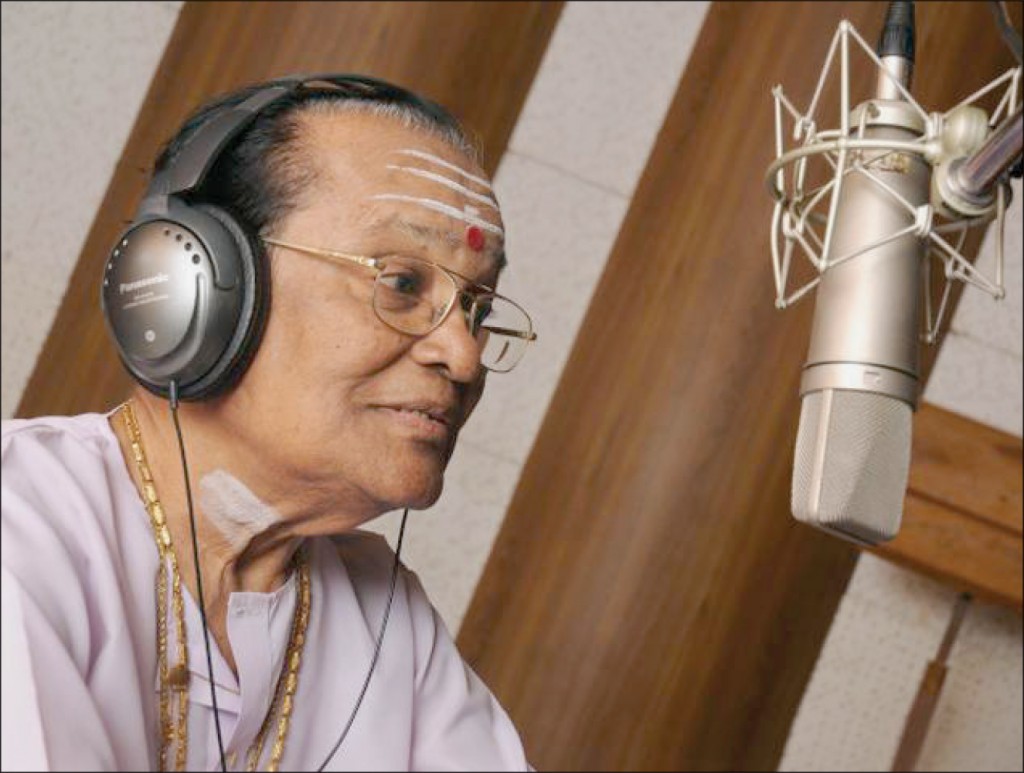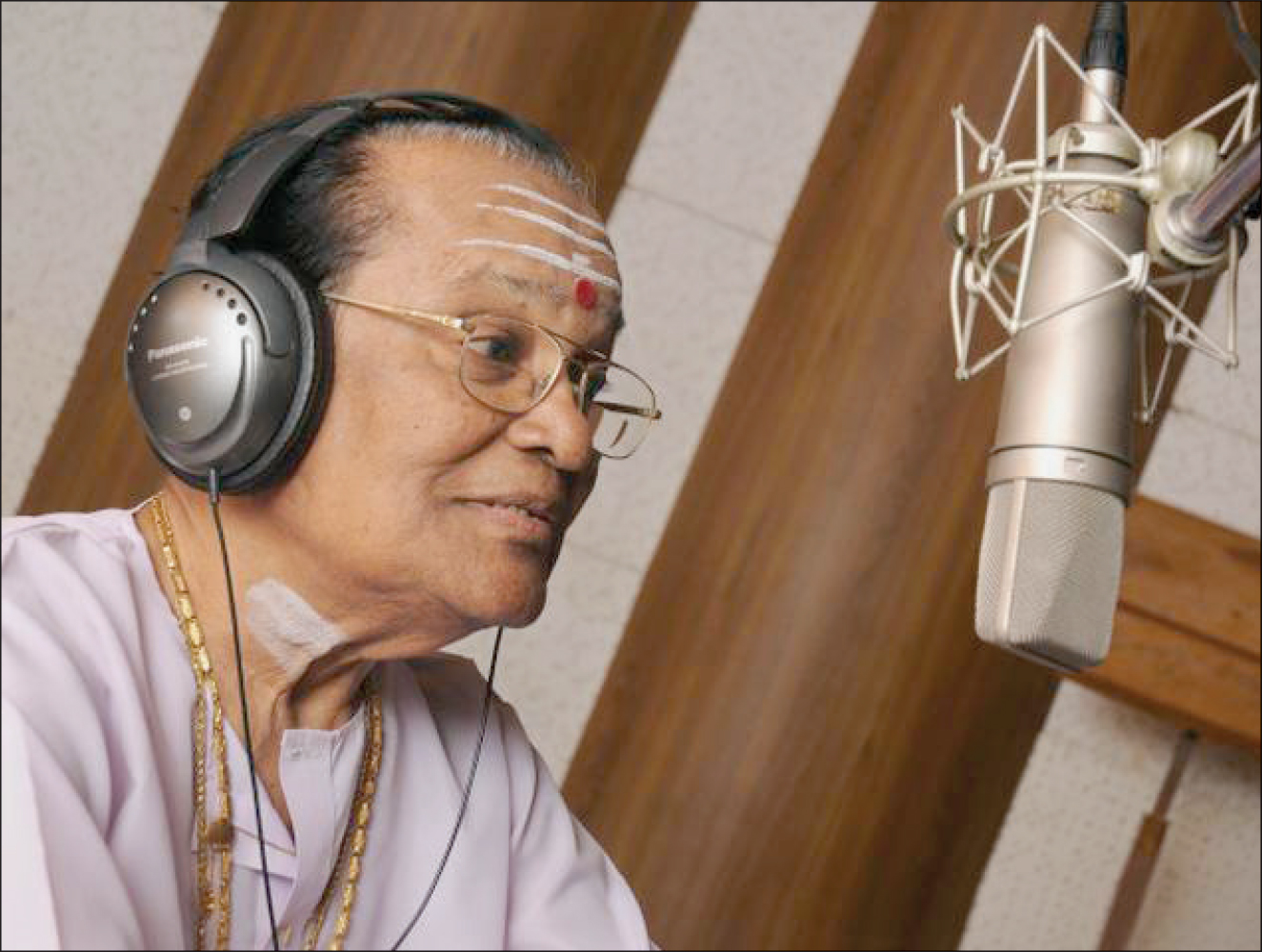
There is only one sun and one moon, there can be only one T M S,” said legendary Tamil film music composer M S Viswanathan at an event many years ago.

T M Soundararajan was one of the greatest singers in Tamil cinema history. But he was also the one who struggled the most for recognition. Years of mind-numbing setbacks preceded decades of sensational success.
He was adored by the masses, by humble folk — restaurant workers, cobblers, dhobis, rickshawallahs, potters, plumbers and coolies. TMS was for them the singer of hope.
But he was also hailed by the affluent society. “Whenever and wherever prosperous Tamilians drove fancy cars — not just in India, but in the US, Canada, Singapore, Malaysia, the Middle East — one of the first things they did was to switch on the radio and listen to TMS,” said late Tamil actor Vivek.
“His voice could melt stone, it could make the meek roar, it could make a sinner repent,” remarked a producer.
TMS was born in 1923, began his singing career in 1946, lived till the age of 91 and died in 2013. He was active in music industry for six decades, and rendered more than 10,000 songs in a few thousand films, besides some 2,000 devotional songs for many deities including his favourite Lord Muruga. But it was for about 30 years — 1955 till 1985 — that he ruled Tamil cinema. His voice rang out all day from music halls and tea shops, in homes and studios.
He was born in Madurai, son of a small-time priest who eked out a living through puja and bhajans. TMS was passionate about music at an early age. He memorised and sang whatever music he came across — bhajans, devotional songs, film songs, particularly those of singing star M K Thyagaraja Bhagavathar, the first superstar of Tamil cinema. Bhagavathar songs got him the best rewards — pakora and coffee — which the boy consumed with relish.
His father couldn’t afford to give TMS proper music training, so the boy organised it himself. He did errands for cinema owners in Madurai and also sang on festive occasions. And they took turns paying ₹15 a month for his music lessons. His guru was Karaikudi Ramanuja Iyengar: the learning focused on 12 varnams and 48 keerthanas of Carnatic music, which gave him a firm foundation in the art.
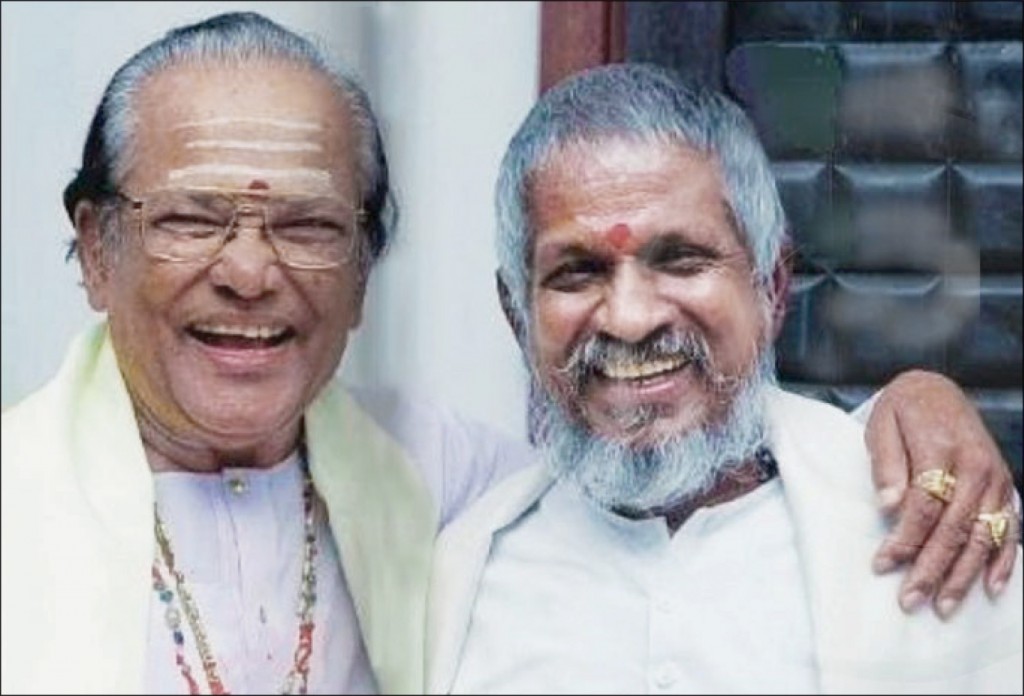
However, TMS flopped in studies and failed in the school matric exam. The future seemed uncertain. He didn’t want to be a priest. He joined Central Studios in Coimbatore and did various odd jobs — cleaning, cooking, taking care of children. He even acted as a beggar in one film, where he sang a song. The book of credits for the film said “Pichaikkaran: T M Soundarrajan.”
At the age of 22, already married and with two kids, he left for Chennai with ₹250 in his pocket and gramophone records of his songs. He found a cheap room in Alwarpet to stay in, located an inexpensive restaurant where he could eat one meal a day. He spent the whole day looking for chances to sing and grabbed any opportunity that came his way.
Whenever and wherever prosperous Tamilians drove fancy cars, one of the first things they did was to switch on the radio and listen to TMS,
It was only in 1950, five years later, that TMS got a chance to sing in Tamil films. And only in 1954 that he got his first big break — when he had almost given up hope about his career as a playback singer. Thiruchi Loganathan was to sing eight songs filmed on Sivaji Ganesan in the film Thookku Thookki. He wanted ₹500 per song. The producers said, “Why don’t you reduce your rate because you will be singing eight songs?” Loganathan said, “My rate is ₹500 a song whether I sing one song or eight songs.”
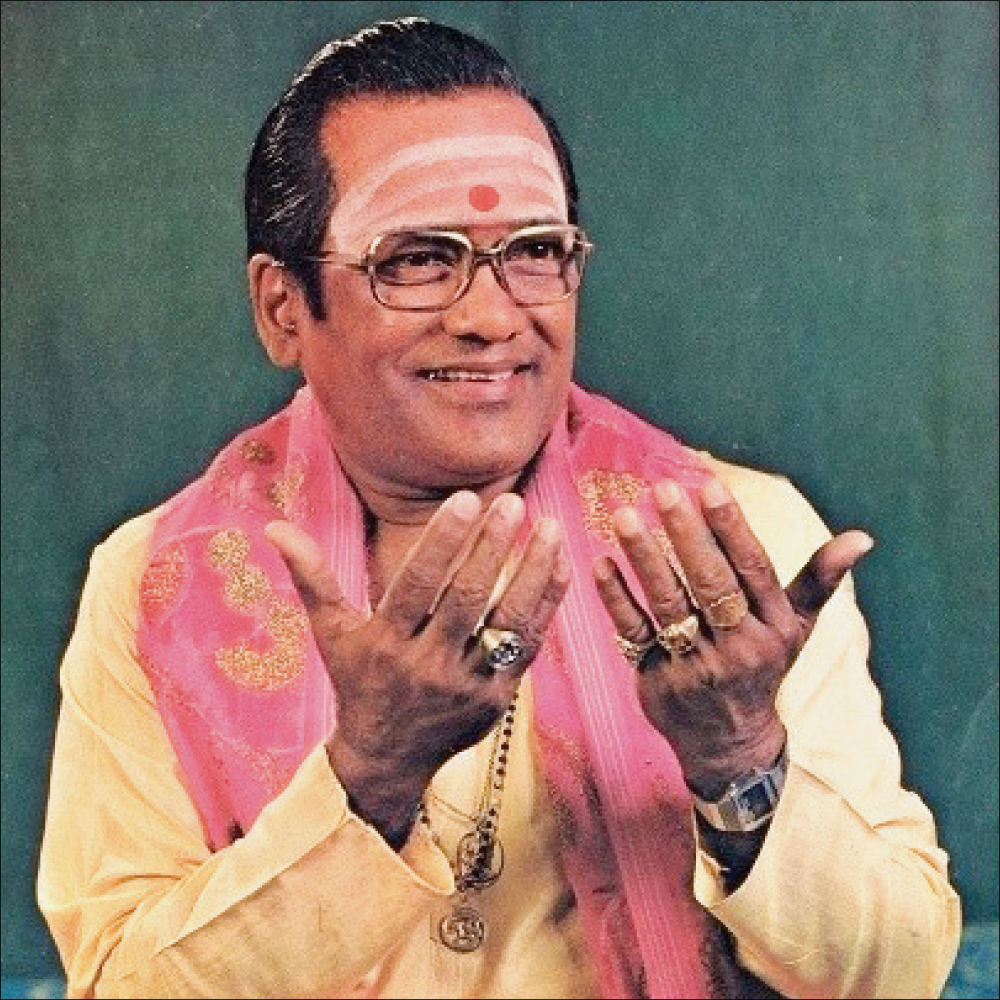
The producers decided to try out the young man from Madurai whom some people were talking about. When TMS was walking on the road, dejected with the unending rebuffs and setbacks, people from Aruna Films stopped him from their car. They said “Are you TMS? We are looking for you”. They tested him, were impressed, and engaged him for a fee of ₹2,000 for eight songs. TMS was elated. But Sivaji Ganesan was upset. He said “How can you engage a newcomer for me? Why don’t you hire C S Jayaraman who sang for me in Parasakthi?”
TMS was distraught and crushed. He told Sivaji, “Please try me out. I’ll sing three songs. If you don’t like my singing, I’ll go home and you’ll never see me again.” Sivaji agreed. He was amazed with TMS’s voice and expressive rendering. He told the producers, “Why only three songs, let him sing all the eight songs.”
Fancy cars of producers and stars lined up outside his house — ironic, because for years he had known no vehicle other than a rundown bicycle.
Thookku Thookki was a massive hit, and its songs are part of music legend. It was one of the first films to star the golden pair of Sivaji Ganesan and Padmini. Three songs in particular — Sundari soundari, Pengalai nambathe and Kurangilirunthu pirandavan manithan — are some of the most lovable songs of the 1950s.
The same year saw the release of Koondukkili, the only film which starred both MGR and Sivaji. A TMS song in the movie, Konjum Killiyana Pennai charmed MGR, who got TMS to sing a song he considered very important in his landmark movie Malaikkallan. The song: Ethanai kalamdan ematruvai. It showed Bhunamathi on horseback, led by a flamboyant MGR. It became a huge hit, so did the movie Malaikkallan, which was remade in Hindi as Azaad, starring Dilip Kumar.
Thooku Thooki and Malaikkallan made TMS the favourite singer of MGR and Sivaji, the two tallest Tamil stars. His career skyrocketed. Success followed success. The person who some months earlier didn’t know where his next meal was coming from, was sought after by one and all. Fancy cars of producers and stars lined up outside his house — ironic, because for years he had known no vehicle other than a rundown bicycle.
For the next few decades, TMS’s power-packed voice mirrored every mood, reflected every rhythm, conveyed every feeling. Songs poured out of this powerhouse — songs of romance, joy, comedy, misery and despair, philosophical reflections, religious devotion, classical ragas, the western beat — reflecting his peerless versatility.
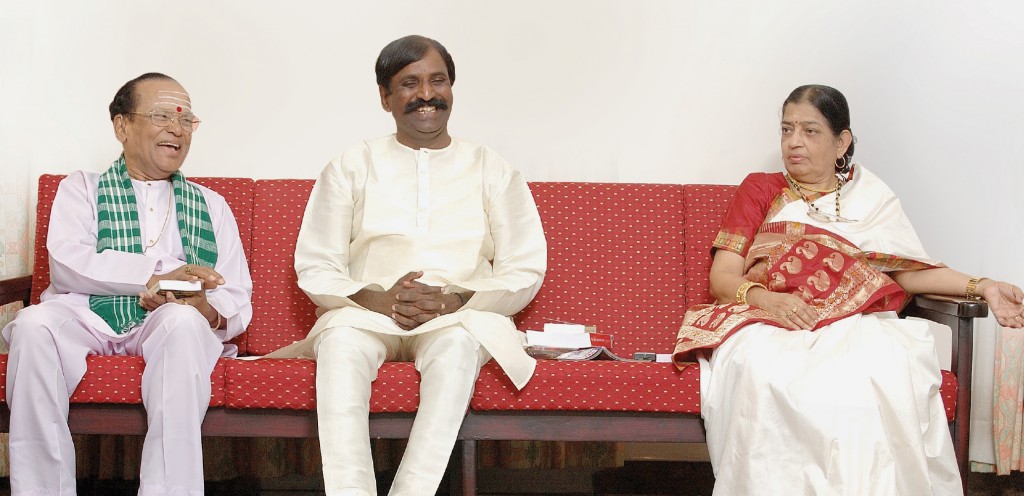
Here’s an anecdote about the calibre of TMS. On one occasion, Sivaji Ganesan was to enact a song sequence. He listened to a recording of that song by TMS, and left the studio immediately. The worried producer asked Sivaji what happened. Said Sivaji: “TMS hasn’t just sung the song, he has enacted it with his voice, and done it so well. I must now ponder about what I can do as an actor to add value to the song.”
Many memorable scenes in Tamil movies are based on TMS songs which are etched in everyone’s memory. For example:
Thoongathe, thambi, thoongathe — Nadodi Mannan, 1958
“Don’t sleep, brother, don’t sleep”, prisoner MGR tells jail guards. The song’s subliminal message for the masses was that MGR worshipped work and detested sloth. A popular song one always associates with both MGR and TMS.
Vanda naal mudhal, indha naal varai — Pava Mannippu, 1961
Sivaji cycles as TMS sings “Over millenia, the oceans, the skies, the trees, the earth have not changed, only man has changed.” The song is a triumph for scriptwriter Kannadasan, singer TMS and actor Sivaji.
Acham enbathu madamaiyada — Mannadhi Mannan, 1961
Full of spectacle, fights, music, dance and romance, this film begins with MGR riding a chariot proclaiming “Fear is folly”. Fans of TMS asserted that “his voice embodies and inspires fearlessness”.
Chithiram pesudadi — Sabaash Meena, 1965
Sivaji in the alluring voice of TMS lauds his pretty sweetheart Malini in front of her portrait; the Malini of flesh and blood hides behind a curtain and enjoys his praise. Winsome visuals, captivating melody.
Masculine voice and impeccable Tamil
What made TMS a stand-out singer? Lyricist Vairamuthu mentions two attributes: his masculine voice and his impeccable Tamil. “To teach my children Tamil, I made them listen to TMS. His pronunciation, the way he uttered every syllable, was perfect.”
The masculinity in TMS’s voice was shaped and honed by composer G Ramanathan, says Vairamuthu. TMS himself has credited Ramanathan for the “lion in his voice”. TMS also owed much to composer M S Viswanathan; “he introduced TMS to the western beat, and made his voice more modern,” says Vairamuthu.

Several of TMS’s songs for Sivaji exemplified the power of his masculine voice as well as the majesty of the Tamil language and the appeal of classical ragas. Example: the iconic Pattum naane, bhavamum naane, sung splendidly by TMS, and filmed on Sivaji in a royal court in Thiruvailaiydal.
As for MGR, TMS’s powerful voice was an asset for the leader’s political ambitions. An example is the celebrated song Naan Aanaiyittal (Enga Veetu Pillai), in which MGR berates the villains of society and thunders “I’ll never forgive those who ill-treat the poor.” The audience roars its approval — of the hero, even more so of the real-life MGR.
Voice adaptation
Vairamuthu says a big plus point of TMS was the way he modulated his voice while singing for any actor, after studying the actor’s speech and voice patterns. His techniques for a song on Sivaji and a song on MGR, for example, were different. Sivaji had a deep stentorian voice, MGR spoke softer.
Fans of TMS asserted that his voice embodies and inspires fearlessness.
Says actor Vivek, “A blind man who heard a TMS song would be able to say for which actor he was singing — Sivaji, MGR, Gemini Ganesh, Muthuraman, Jaishankar or Ravichandran.”
During the 1980s and later, TMS performed many live music shows abroad to enthusiastic full houses. His 60th year as singer in 2006 spurred a spectacular celebration in Madurai led by then Chief Minister M Karunanidhi. Artists young and old hailed the quintessential Tamil singer as the uncrowned king of Tamil film music. He passed away seven years later.
The author is a senior journalist and a member of the Rotary Club of Madras South






